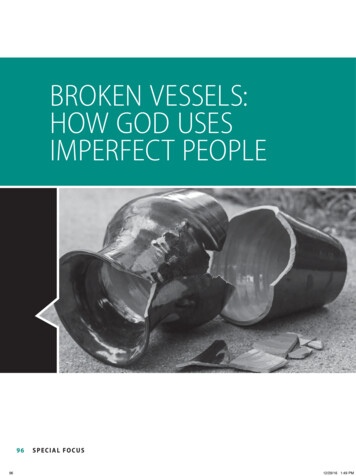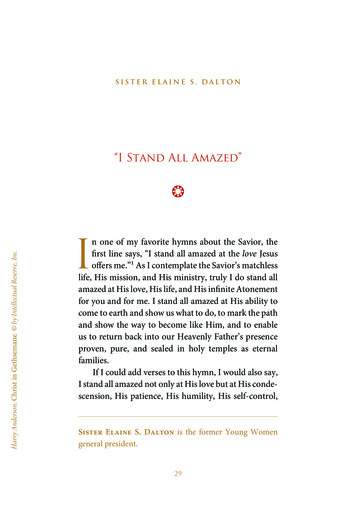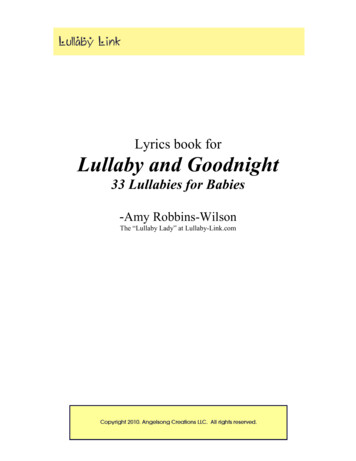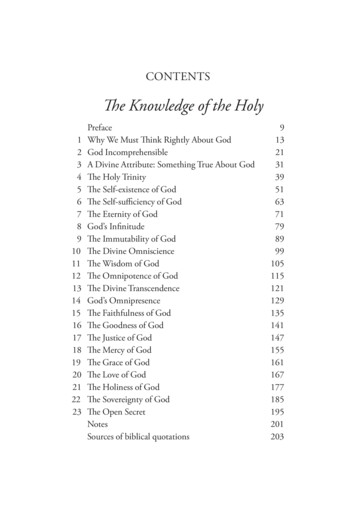
Transcription
BROKEN VESSELS:HOW GOD USESIMPERFECT PEOPLE9696Special focus12/29/16 1:49 PM
Brokenness and pain.Unfortunately, brokenness and pain are universal. It may have been fromthe pain of that young summer love that ended prematurely, the pain ofabandonment and isolation, the pain of chronic illness or death, or the pain webring on ourselves through our sin and failure. But we all know what pain feelslike, and it feels like being broken.Like clay jars, we are fragile. We can be easily broken—but we do not haveto remain “broken vessels.” We are never beyond the healing and redeemingpower of God. In the face of failure, God responds with restoration. In spiteof our shortcomings, God will work in and through us. In the midst of ourcircumstances, God will help us endure.God doesn’t stop there! He seeks to use us to speak into the lives of other“broken vessels.” He uses our experiences with His grace and power to comfortothers. He desires to use us to help our neighbors and loved ones encounter theGod who brings hope and restoration.“Now we have this treasure in clay jars, so that this extraordinary power maybe from God and not from us” (2 Cor. 4:7). We are broken vessels, but this greattreasure—the good news of Jesus Christ—shines through our brokenness.DANIEL IMDaniel is Director of Church Multiplication for NewChurches.com and LifeWay. He is co-author of PlantingMissional Churches: Your Guide to Starting Churches that Multiply and blogs at Danielim.com. Daniel is a TeachingPastor at The Fellowship in Nashville. Married to Christina, they have three children.979712/29/16 1:49 PM
GET INTOTHE STUDY5 minutesSESSION 1A FRESH STARTSAY: “For the next six sessionswe will be discussing the wayChrist uses imperfect people.”Invite members to turn topage 3 in the Personal StudyGuide (PSG) and reviewThe Pointsession titles.We fail; Jesus restores.LEADER PACK: Point to theThe Bible Meets Lifesession titles on Item 8:Broken Vessels. Note thatWhen we come to faith in Christ, wethese sessions focus onrealize there is nothing we can do topassages from both the Oldearn a right relationship with God.and New Testaments.We fail, but Jesus gives us hope.Now that we are Christians, we stillfail, but we sometimes chastiseourselves for failing. The same grace we needed for salvation is the same gracewe need to live it out. The hope we have in Christ is grounded in grace, and weneed to experience that grace day by day.The PassagesJohn 18:15-18,25-27; 21:15-19The SettingThe initial events of the focal verses occurred on the night before Jesus’crucifixion, at the high priest’s residence in Jerusalem after Jesus’ arrest. TheDISCUSS: Draw attention tothe picture (PSG, p. 94) as youintroduce Question #1: Whenhave you really enjoyedmaking a mess?9898latter events took place after Jesus’ resurrection (perhaps a couple weekslater). After the Festivals of Passover and of Unleavened Bread, Jesus’ disciplesleft Jerusalem and returned to Galilee. One morning on the shore of the Seaof Tiberias (Sea of Galilee), Jesus appeared to seven of His disciples while theywere fishing.S e ss i o n 112/29/16 1:49 PM
John 18:15-18,25-27OPTION: IN ADVANCE,15 And Simon Peter followed Jesus, and so did anotherthe Michael Jordan Nike disciple: that disciple was known unto the high priest, and“Failure” commercial. A linklocate and prepare to showwent in with Jesus into the palace of the high priest.to this clip can be found atBibleStudiesForLife.com/16 But Peter stood at the door without. Then went out thatAdultExtra. Use the video clipother disciple, which was known unto the high priest, andbefore or as a follow-up to thespake unto her that kept the door, and brought in Peter.17 Then saith the damsel that kept the door unto Peter, Artquestion. Discuss reactions tothe video. Say: “We fail, butJesus gives us hope.”not thou also one of this man’s disciples? He saith, I am not.18 And the servants and officers stood there, who had madeGUIDE: Direct attention toa fire of coals; for it was cold: and they warmed themselves:The Bible Meets Life (PSG,and Peter stood with them, and warmed himself.p. 95). Highlight the examples.25 And Simon Peter stood and warmed himself. They saidtherefore unto him, Art not thou also one of his disciples? Hethe author gives of how wesometimes hit rock bottom.Reinforce the importanceof being restored in Christdenied it, and said, I am not.by reading The Point26 One of the servants of the high priest, being his kinsman(PSG, p. 95): We fail; Jesuswhose ear Peter cut off, saith, Did not I see thee in therestores.garden with him?27 Peter then denied again: and immediately the cock crew.Even followers of Jesus still falter and fail.PRAY: Begin the Bible studywith prayer. Ask for God’swisdom in understanding HisVerse 15-16. On the night before Jesus’ crucifixion, severalevents happened quickly in different locations in Jerusalem.John reported that after Jesus was arrested, the authorities“led him away to Annas first,” and later, “Annas had sent himbound unto Caiaphas the high priest” (John 18:13,-24). Annashad previously been the high priest (and so still retained thetitle) and Caiaphas “was the high priest that same year” (v. 13).While the Jewish leaders questioned Jesus inside the highpriest’s residence, another scene was unfolding outside in thecourtyard. Simon Peter and another disciple had followedJesus and those who had arrested Him after they left thegarden of Gethsemane. That disciple was known untothe high priest. The word known could refer to a relative,Word in this study. Thank Himfor the way He takes us wherewe are and restores us fully.S U G G E S T E D U S E W E E K O F J U LY 23999912/29/16 1:49 PM
THE POINTWe fail; Jesus restores.STUDY THE BIBLEJohn 18:15-18,25-27.15 minutesGUIDE: Before reading thepassage, set the context bysummarizing the informationin The Setting on page 98.READ: Ask a volunteer to readJohn 18:15-18,25-27.GUIDE: Use BibleCommentary 1 to explainthe background for Peter’sencounter with the servantsand officers as he sought toblend in.SUMMARIZE: Highlight thefollowing information fromPSG pages 96-97:Now Peter found himselfsurrounded by a groupof soldiers, temple policefrom the chief priests, andPharisees—all led by JudasIscariot, a fellow disciple(John 18:3).(Continued on next page.)10 0100a close friend, or simply any person who was not a stranger.John may have actually been a distant relative of the highpriest. Whatever the case, his relationship was such that hehad access to a secure property. Thus, he went in with Jesusinto the palace of the high priest. The other disciplewent back out to the courtyard, spake unto her that keptthe door, and gained entry for Peter. The identity of this otherdisciple is unknown; most scholars, however, believe it wasJohn, the son of Zebedee, who rarely identified himself in hisown narratives.Verse 17. The other disciple may have been known as afollower of Jesus. Perhaps the damsel that kept the doorknew this. As Peter entered the courtyard, the doorkeepermay have been shocked and surprised that anyone who knewJesus would have been there. So she asked, Art not thoualso one of this man’s disciples? Peter quickly responded: Iam not. This was his first denial.Verse 18. Jerusalem is on a mountain located at theedge of a desert. At night it can get cold and blustery. This isparticularly true in the month of Nisan (March-April) aroundthe time of Passover. Because of the chilly night air, theservants and officers had made fire of coals; and stoodaround it warming themselves. (John will mention anothercharcoal fire in 21:9.) These officers likely were Levites,members of the police who kept order at the temple, guardedthe temple complex, and protected the high priest and hisfamily. That didn’t seem to bother Peter even though some ofthem surely had been in the group that arrested Jesus. Infact, Peter stood with them, and warmed himself.1Verse 25. While Jesus was being questioned inside the house(John 18:19‑24), Peter was about to face an interrogation ofhis own. Some of those who were also huddled around thefire repeated the question Peter had heard earlier: Art notthou also one of his disciples? Peter again denied it;Matthew 26:72 indicates that “he denied with an oath.”Verse 26. Perhaps before the echo of Peter’s words hadsubsided, another person joined in. This time the questionbecame more personal and accusatory. John noted thisquestioner was his kinsman whose ear Peter cut off.Earlier that night in the garden of Gethsemane, Peter had cutoff the ear of the high priest’s servant, whom John identifiedS e ss i o n 112/29/16 1:49 PM
as Malchus (John 18:10). By asking, Did not I see thee inthe garden with him? the man standing around the fire withPeter indicated he was a member of the arresting party andhad seen the courageous disciple wielding a sword to protecthis Master.Verse 27. Peter, however, was anything but courageous inthe high priest’s courtyard. In response to this third questionabout his loyalty, Peter then denied Jesus again—the thirdtime—just as Jesus had predicted (13:36-38). Peter insistedearlier that very night, “I will lay down my life for thy sake”(v. 37); however, three times he denied being a follower ofJesus. After Peter’s third denial, immediately the cock crew.Morning was approaching, but it seemed darker than everfor Peter. Just as every follower of Christ will do at some time(and at multiple times), Peter failed his Lord. But failure isn’talways final, as Peter would discover in the weeks to come.John 21:15-1915 So when they had dined, Jesus saith to Simon Peter,Simon, son of Jonas, lovest thou me more than these? Hesaith unto him, Yea, Lord; thou knowest that I love thee. Hesaith unto him, Feed my lambs.16 He saith to him again the second time, Simon, son ofJonas, lovest thou me? He saith unto him, Yea, Lord; thouknowest that I love thee. He saith unto him, Feed my sheep.Peter responded by pullingout his sword and cutting offthe ear of the high priest’sservant. Jesus responded, notwith praise, but with a harshreprimand telling Peter to puthis sword away (vv. 10-11).Jesus then healed the man’sear (Luke 22:51), allowedHimself to be arrested, andwas taken away. Peter’s whole world had justturned over. But after all thedisciples initially ran away(Matt. 26:55), Peter at leastmade an effort to get nearenough to see and hear whatwas going on—as long as hecould do it undetected. At first glance, it would seemthat Peter wanted to stayclose to Jesus, but whenpeople began to ask abouthis connection to Jesus, thedenials began. Peter then remembered theLord’s word and went out andwept bitterly.17 He saith unto him the third time, Simon, son of Jonas,lovest thou me? Peter was grieved because he said unto himDISCUSS: Question #2the third time, Lovest thou me? And he said unto him, Lord,(PSG, p. 97): What emotionsthou knowest all things; thou knowest that I love thee. Jesuswould you have experiencedin Peter’s situation?saith unto him, Feed my sheep.18 Verily, verily, I say unto thee, When thou wast young, thougirdedst thyself, and walkedst whither thou wouldest: butwhen thou shalt be old, thou shalt stretch forth thy hands,and another shall gird thee, and carry thee whither thouwouldest not.10110112/29/16 1:49 PM
THE POINTWe fail; Jesus restores.DISCUSS: Question #3(PSG, p. 98): What factorsGod. And when he had spoken this, he saith unto him,may cause us to shrinkFollow me.back from identifyingwith Christ?(Alternate: What are our optionswhen we fail as big as Peter did?)TRANSITION: ”Peter haddenied Jesus three times. ButJesus wasn’t going to leavePeter feeling like a failure.In the next verses, we’ll seePeter’s restoration.”STUDY THE BIBLEJohn 21:15-1920 minutesREAD: Ask a volunteer to readJohn 21:15-19.GUIDE: Using BibleCommentary 2 on this pageand page 103, explain whyJesus asked Peter three timesabout the apostle’s love forHim, and then commandedPeter to feed His sheep.10210219 This spake he, signifying by what death he should glorifyJesus restores.Verse 15. Jesus appeared to many of His followers on severaloccasions in the 40 days between His resurrection and Hisascension. Jesus made these appearances to prove He wasalive and to confirm His identity as the Messiah, the Son ofGod. Jesus also used this time to teach His followers andprepare them for their mission as His apostles.Before Peter could be properly prepared for his future,however, he had to be restored from his past. Peter continuedto bear the emotional weight of his betrayal for at least morethan a week after it happened.Peter had witnessed the risen Christ on at least a couple ofoccasions during the days after the resurrection (Luke 24:3334,36‑49; 1 Cor. 15:5,7). Like the other remaining disciples,he seemed unsure what to do with his life from that pointforward. So one night Peter and six other disciples decided togo fishing (John 21:1‑3). Fishing had given them a livelihoodand a purpose before they first met Jesus. But after fishing allnight they caught nothing until early in the morning when aman on the shore told them to “cast the net on the right side ofthe ship” (v. 6). Then “they were not able to draw [the net] forthe multitude of fishes”—John put the number at “an hundredand fifty and three” (v. 11). However, when Peter suddenlyrealized who had spoken to them, he was so excited aboutseeing the Lord again, he dropped the net, “cast himself intothe sea,” and swam to shore to see Jesus (v. 7).2After the disciples enjoyed a breakfast of bread andfish (vv. 9-14), Jesus initiated an important conversation withSimon Peter. As the dialogue began, Jesus asked, Simon,son of Jonas, lovest thou me more than these? HowJesus addressed Peter was as significant as the question Heasked. Simon was his given name; Peter was the name Jesushad given him on their first meeting (1:42). Peter means“rock,” but that’s not how Jesus referred to him on thisoccasion. On that cold, dark night in the courtyard, Peterhad demonstrated his loyalty was not as solid as he hadprofessed. Without mentioning Peter’s failure, Jesusconfronted its reality simply by how He addressed thisdisciple, the son of Jonas.S e ss i o n 112/29/16 1:49 PM
At no point in this conversation did Jesus ever directlyaddress Peter’s denial. But with each question the Lordconfronted Peter about his true loyalty. Jesus first asked him,Lovest thou me more than these? While the first part of thequestion is straightforward, the last word poses a bit of achallenge to interpret. To what or whom was Jesus referringwhen he mentioned these? Certainly Jesus could havepointed to the boat and miraculous catch of fish, wantingto know if Peter loved Him more than he loved the thrill offishing. However, it’s more likely Jesus pointed to the otherswith them on the beach and asked whether Peter’s love forHim was greater than that of the other disciples. After all,Peter had once brashly proclaimed a commitment to Christgreater than that of all the other disciples (Mark 14:29).Perhaps Jesus was testing Peter’s humility and challenginghim to consider his words carefully before making boldpronouncements.In response to Jesus’ question, Peter replied, Yea, Lord;thou knowest that I love thee. Despite his failure, Peter wascertain Jesus knew His apostle’s love for Him was genuine.Peter was no longer willing to assert he was better than theother disciples. Failure can be a great teacher, and it seemsPeter had learned at least not to compare his commitment withthat of others.Jesus simply replied to Peter, Feed my lambs. Directedto a fisherman, this command may have seemed strange. Butconsidering the words and actions of Jesus over the previousthree years, it made perfect sense. Jesus had declared Heis “the good shepherd” (John 10:11,14). During His ministryJesus demonstrated He is the One who directs, protects,provides, heals, and so much more; He did this for the peopleof His flock. The disciples witnessed His actions and evenparticipated with Jesus in caring for people. Thus, with thatphrase Jesus effectively was commissioning Peter to assumethe responsibility of leadership for this task. In addition tocalling Peter to be a fisher of men (Matt. 4:19) and do the workof evangelism, Jesus was calling Peter to do the work of apastor in caring for the flock.The tense of the verb translated feed indicates an ongoingaction; it could be rendered “keep on feeding.” This wasnot to be a one-time action, after which Peter would moveon to another, perhaps more exciting task. It would requireconfident words from a leader who was constantly lookingto move forward, as well as patience and care from a humbleservant toward those who are young and vulnerable.SUMMARIZE: In John 21,we see God’s pattern ofrestoration in this, the thirdtime in John’s Gospel thatJesus revealed Himself to Hisdisciples after His resurrection(PSG, pp. 99-100).Peter and the disciplesreturned to what they’dalways known—fishing—but after an entire night ofnot catching anything, Jesuscalled out to and told themto “Cast the net on the rightside of the ship, and ye shallfind” (v. 6).They obeyed and wererewarded with such a largecatch of fish they couldn’thaul the net in.John said to Peter, “It is theLord” (v. 7).Impulsive as always, Peterjumped into the water andswam to the shore to be withJesus—even though the boatwas only 100 yards away.After they had eatenbreakfast, we see a personalinteraction between Jesusand Peter. Jesus asked Peterthree times about his love forHim. Three times—the samenumber of times Peter hadbetrayed Jesus.Verse 16. A second time Jesus posed an almost identicalquestion to Simon, son of Jonas. This time, however, Jesus10310312/29/16 1:49 PM
THE POINTWe fail; Jesus restores.GUIDE: Using BibleCommentary 3 describe thedifference between the Greekwords used for love and thenuance this perhaps adds tothis important encounter.SUMMARIZE: Ask a volunteerto read or summarizeDigging Deeper on PSGpage 100 for a descriptionof the implications of Peter’sreinstatement.DISCUSS: Question #4(PSG, p. 101): When have youseen God bring restorationto a seemingly hopelesssituation?GUIDE: Use BibleCommentary 4 on page 105to explain Jesus’ propheticword about Peter’s death.10 4104did not make any comparisons in inquiring about the disciple’slove. And again Peter gave the same response, contendingJesus knew the extent of his love.Once again Jesus instructed Peter on what he was to do:Feed my sheep. As before, the emphasis was on Christ’sflock—those who would believe in Jesus and follow Him astheir Lord and Savior. The slight difference in wording couldhave referred to the broader task Peter would undertake ofteaching and guiding those who were beyond the first stepsof discipleship. Or the variation in Jesus’ words may simplyhave been stated for emphasis.Verse 17. Jesus continued to explore Peter’s heart byasking him the third time. As last time, He made nomention of comparing Peter’s love with that of the otherdisciples.Rather than noting Peter’s reply right away, John firstrecorded that Peter was grieved because Jesus said untohim the third time, Lovest thou me? To be grievedis more than being sad or hurt; it means to be deeplydistressed. Some biblical scholars explain Peter’s grief inrelation to the words used for “love” in the dialogue. Inthis passage the Greek words for “love” are agapao, oftendefined as a generous, selfless love associated with God;and phileo, often typified as brotherly love. These scholarssuggest that Peter’s grief was due to Jesus’ use of phileo inHis third question. Jesus had used agapao in His first twoquestions. “Jesus seemed to be doubting whether Peter felteven the lesser form of love for Him.”1 Other scholars arguethat since the same Greek words are used interchangeably inother places in the Gospel of John (as well as agapao beinga standard verb for “love” at the time), it is doubtful the wordchanges were what caused grief for Peter.2In either case, Peter was highly distressed when Jesusquestioned him the third time. Also for the third time, Peterprofessed his love for Jesus exactly as before. But the apostlealso added a new statement this time: Lord, thou knowestall things. Peter acknowledged that Jesus is omniscient(all-knowing) because He is God. Jesus can see into people’shearts, including Peter’s. He knows our most intimate, innermost thoughts, feelings, and loyalties.In response, Jesus again called Peter to Feed my sheep.This pastoral commission took hold in Peter’s life. Years laterhe would write that church elders (leaders) were responsibleto “feed the flock of God which is among you” (1 Pet. 5:2),3S e ss i o n 112/29/16 1:49 PM
which is what Peter had done throughout his ministry.Three times Peter had failed the Lord; three times he wasrestored and commissioned by the Lord. The foundation forPeter’s future ministry, just as it is for anyone’s ministry, wasan ongoing love for Christ.DISCUSS: Question #5(PSG, p. 102): How can ourgroup help others come toa place of restoration?4Verse 18. Jesus went on to elaborate on Peter’s futureand the end of his ministry. The Lord first noted the freedomPeter had formerly experienced: when thou wast young,thou girdedst thyself, and walkedst whither thouwouldest. But when Peter embraced Christ’s commissionhis life would change.Jesus continued, when thou shalt be old, He told Peter,his experience would be very different. Thou shalt stretchforth thy hands, and another shall gird thee, and carrythee whither thou wouldest not. This could refer eitherto being put into chains or to being nailed on a cross, wherehis hands/arms would be outstretched. Peter experiencedboth, being imprisoned for preaching the gospel andeventually being martyred in Rome during the persecution ofChristians. “Tradition holds that Peter was crucified upsidedown because he felt unworthy to die in the same manner asJesus.”3 Jesus’ words emphasized the cost of discipleship.(Alternate: How can God useVerse 19. John made the point, this spake he, signifyingby what death Peter would suffer. Jesus’ words to Peterrevealed that the apostle would die for his Lord, and He alsoindicated how he would die. What Peter boldly proclaimedon the night before Jesus’ crucifixion, “I will lay down my lifefor thy sake” (John 13:37), would come to pass in God’s time.John also mentioned that Peter’s death would glorifyGod. Several times Jesus equated His death with His or HisFather’s glorification (12:23,27‑28; 13:31‑32; 17:1). Like hisLord, Peter’s willingness to follow the will of God, even untodeath, would also bring glory to God.Jesus’ closing words in this section, Follow me, were arepetition of some of the first words He had spoken to Peterwhen Jesus called him to be His disciple (Matt. 4:19). In thiscontext, however, Peter had a far greater understanding ofthe meaning of Jesus’ command. Jesus had just laid out thereality of what discipleship would include for Peter. Thedisciple knew he would be following Jesus not only to learnfrom Him, but also to die like Him.wants us to continue trusting,your story of forgiveness andrestoration to help others?)OPTION: IN ADVANCE, locatesome tarnished silverware ora tarnished brass item as wellas some polish and a cleaningcloth. Display the tarnisheditem and state that when wefail, we shouldn’t lose hope.Polish the item to restore it’sshine and usefulness. Say:“Jesus forgives, restores, andhoping, and following Him.Discuss how Jesus restoredPeter to service and remindgroup members that Jesuscan restore us to service in Hisname today.”DO: Invite volunteers to sharetheir responses to the activityon PSG page 102: “A Pictureof Forgiveness.“1. R. V. G. Tasker, The Gospel According to St. John, vol. 4 in Tyndale Old Testament Commentaries (Grand Rapids: Eerdmans,1960), 233.2. Ibid.; Gerald L. Borchert, John 12–21, vol. 25B in The New American Commentary (Nashville: Broadman & Holman, 2002), 335.3. Steven L. Cox, “Peter” in Holman Illustrated Bible Dictionary, gen. ed. Chad Brand, rev. ed. (Nashville: B&H Publishing Group,2015), 1253.10510512/29/16 1:49 PM
THE POINTWe fail; Jesus restores.LIVE IT OUT5 minutesGUIDE: Emphasize The Point:We fail; Jesus restores.REVIEW: Review Live It Out(PSG, p. 103; see text to theright). Encourage each groupmember to follow throughthis week with at least one ofthe applications.WRAP IT UPLIVE IT OUTYour sin—your denial of Jesus—is not the end of the road.Christ offers a fresh start. How will you live out that truththis week? Choose one of the following applications: Remember. Look back to one of the times that yousinned. Thank God for His forgiveness and consider theways that He has brought restoration to your life. Memorize. Memorize Psalm 139:23-24. Pray this on aregular basis to keep short accounts between you andGod. Is there a circumstance or sin in your life for whichyou need to ask God’s forgiveness? Write. Write a letter of forgiveness to someone whohas hurt you. Whether or not you give this letter to theperson, the writing process can help you heal and fullyforgive them just as Jesus has fully forgiven you.We’ve all messed up, but God’s grace is so deep and Hislove is so wide that He will always restore us when we cometo Him in repentance and faith.GUIDE: Emphasize that nomatter how much we thinkwe have failed the Lord, Heis always ready to restore uswhen we return to Him.PRAY: ”Father, help us to seeourselves as You see us, and tohave the courage to step upto all that You have called usto do.”NOTE: Remind groupmembers that PSG pages 6-9are there to journal oneanother’s prayer requests.10 6106S e ss i o n 112/29/16 1:49 PM
Luke 24:13-35; 1 Cor. 15:5). Theyreported the Lord had alsoILLUSTRATOR PHOTO/ BOB SCHATZ (9/36/10)appeared to Peter (Mark 16:12-13;Luke 24:13-35; 1 Cor. 15:5).Jesus then appeared to tenof the disciples in Jerusalem(Luke 24:36-43; John 20:19-25).Emmaus is thought to be the site of thehouse of Cleopas.No evidence is more compellingfor Jesus’ physical resurrectionthan His postresurrectionappearances. Jesus appearednumerous times to His followers.He first appeared to MaryMagdalene in the garden, nearthe tomb, on Sunday morningfollowing His crucifixion (Mark 16:922; John 20:11-18). Later that samemorning, He appeared to the otherwomen who came to anoint Hisbody (Matt. 28:8-10; Mark 16:1).He next appeared to Cleopasand an unnamed disciple on theroad to Emmaus (Mark 16:12-13;SHARING THEGOOD NEWSWe often fail in life, but thetruth is that if we have cometo Christ through repentanceand faith, He stands ready toredeem even the worst of ourfailures.He appeared to them again theEach week, make yourselffollowing week, with Thomasavailable either before or afterpresent (John 20:26-31; 1 Cor.the session to speak privately15:5). Later He revealed Himself towith anyone in your groupseven of the disciples by the Sea ofwho wants to know moreGalilee, where they were fishing.about becoming a Christian.Paul wrote that more thanSee the article, “Leadingfive hundred people at oneSomeone to the Greatesttime witnessed Jesus’ eighthDecision of All,“ on page 2 forpostresurrection appearance. Paulguidance in leading a personalso shared that Jesus appeared toto Christ.His brother James (1 Cor. 15:6,7).Scripture records two finalappearances to the disciples,first when he gave them whatsome call “another commission”(Luke 24:44-49), and for thelast time at His ascension(Luke 24:50-53; Acts 1:3-8).Remind group members thatpage 2 in the PSG offersguidance in how to become aChristian. Encourage believersto consider using this articleas they have opportunities tolead others to Christ.The excerpt above is from the article “Jesus’Postresurrection Appearances” (Winter 2002-03), whichrelates to this session. More Biblical Illustrator articles areavailable that relate to this session. See page 7 aboutBiblical Illustrator.Get expert insights on weekly studies through the Ministry 712/29/16 1:49 PM
The Bible Meets Life (PSG, p. 95). Highlight the examples the author gives of how we sometimes hit rock bottom. Reinforce the importance of being restored in Christ by reading The Point (PSG, p. 95): We fail; Jesus restores. PRAY: Begin the Bible study with prayer. Ask for God's wisdom in understanding His Word in this study. Thank Him











